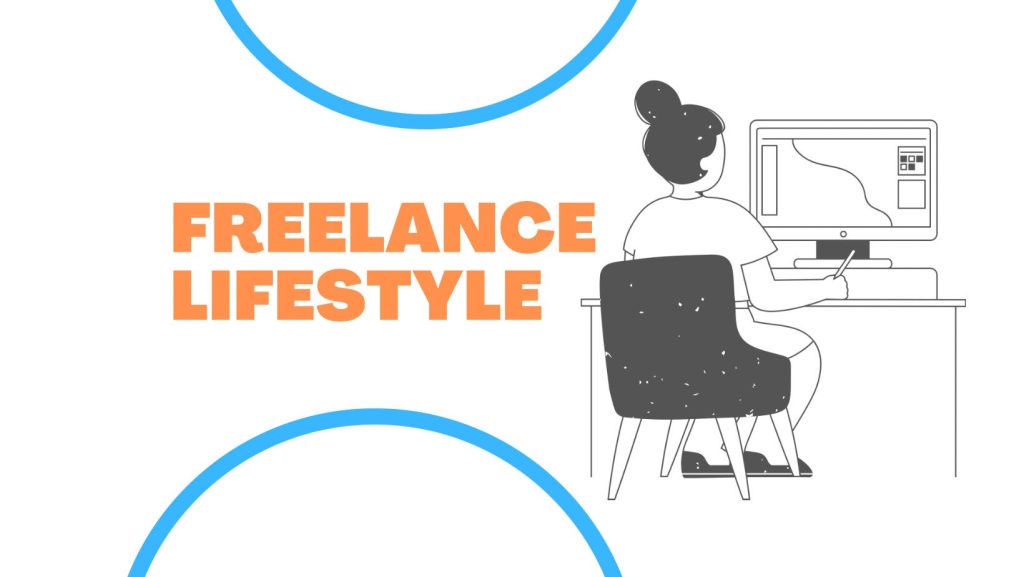The freelance lifestyle is often glamorized as a carefree existence filled with leisurely gym sessions, midday cocktails, and minimal client calls. However, the reality is quite different. While we believe that anyone can achieve the freelance lifestyle they desire, it’s important to dispel the myths and acknowledge the hard work that comes with it.
(If you don’t know where to start, first read this article: How to start freelancing? )
What Does the Freelance Lifestyle Mean?
Embracing the freelance lifestyle means taking charge of your own destiny. It’s about proactively seeking opportunities, rather than shying away from responsibility and difficult tasks. As a freelancer, you don’t need a manager to dictate how you should do your job. You possess the skills, experience, and integrity to thrive independently.
Choosing the freelance lifestyle means sacrificing the security of having someone else make decisions for you. However, it comes with numerous benefits. You have the freedom to set your own working hours, surpass previous income limitations, and select the clients and projects you want to work on. Freelancing grants you the flexibility to make choices that align with your desired lifestyle. For instance, you’re no longer confined to just two weeks of annual paid leave; instead, you determine your earnings to support extended time off.
Debunking Common Freelance Myths
Now, let’s debunk two pervasive myths about freelancing in order to understand what it truly entails.
Myth #1: Freelancing is effortless.
If freelancing were easy, everyone would do it. While it offers increased flexibility and autonomy, most individuals who have embarked on this journey would attest that it’s far from easy. There are various reasons for this.
One major challenge is the initial lack of security when starting out as a freelancer. Unlike traditional salaried positions, where your paycheck is predictable, freelancers have to establish a steady stream of revenue. A consistent income is not guaranteed from day one.
Myth #2: Freelancing is passive income.
Many people have a misguided notion that freelancing involves leisurely days spent on sandy beaches, with drinks in hand and minimal effort. While freelancing does provide opportunities for travel, it’s important to recognize that you still have to work to earn money. Unlike in a traditional office job, where you get paid for idle chatter by the water cooler, you’re only compensated for delivering results in freelancing.
In reality, freelancing is the opposite of passive income. Although you may eventually scale your business and reduce day-to-day involvement, you’ll still need to work significantly to sustain your livelihood.
Tips for Thriving in the Freelance Lifestyle
Now that we have a clear understanding of freelancing, here are some tips for maximizing your success in this career path.
-
Avoid excessive comparison
If you choose the path of a freelancer, embrace your unique journey and refrain from comparing yourself to others. Don’t feel inadequate because other freelancers may be more successful, and don’t doubt your decision when your friends with traditional jobs don’t face the same challenges as you. The only valid comparison is to benchmark yourself against your peers and competition in order to improve your business.
-
Cultivate friendships with other freelancers.
Freelancing can be a solitary pursuit if you let it. To counteract this, make an effort to connect with fellow freelancers. Surrounding yourself with like-minded individuals not only provides emotional support but also serves as a platform for exchanging ideas on entrepreneurial growth. Seek out local freelance meetups or online communities.
Many people struggle to comprehend why someone would choose the freelance lifestyle. Be prepared for doubters and naysayers who may question your choices. They may express concerns about your ability to secure a “real job,” worry about your retirement, or highlight the tax complexities faced by self-employed individuals. Remember that you made your decision for a reason. Embrace your reasons and maintain confidence in your chosen path despite others’ uncertainties.
7 ways to maintain a happy and healthy freelancing lifestyle
As your own boss, there are many benefits to enjoy, but it’s important to remember the responsibilities that come with it. Here are some tools and tips to help you achieve a healthy work-life balance.
- Set clear boundaries between work and home: When starting as a freelancer, you’ll likely work from home. It’s easy to blur the lines between work and personal life, so designate a specific area in your home for work. Make it comfortable and personally inspiring to boost your creativity and productivity. Pinterest is a great app for finding workspace decoration ideas.
- Establish a work schedule: Once you have your dedicated workspace, create a work schedule that suits you. Find the part of the day when you’re most productive and plan your work around that time.
- Stay organized: Organization is key as a freelancer. Keep your files sorted by creating folders for each project on your computer. Maintain a to-do list for each project to track progress. Apps like Wunderlist and Evernote can help you manage your workflow more efficiently.
- Manage your finances: Freelancers are responsible for every aspect of their business, including finances. Keep your bills up to date to avoid unnecessary stress. Invest in budget management apps like Goodbudget or Moni to track your expenses and upcoming payments.
- Socialize: It’s important to step out of your work bubble and connect with others. Use LinkedIn to expand your professional network or attend local meetups through Meetup to meet people with similar interests.
- Prioritize your health: Eating well and exerciseing regularly contribute to a happier and healthier life. Take care of your body to combat the stress that comes with freelancing. Ensure you get enough sleep and consider meditation if you have trouble sleeping. The Headspace app offers guided meditation exercises.
- Take time off: Remember to have fun and enjoy the freedom that freelancing offers. Plan occasional holidays and engage in activities that help you relax and disconnect from work.
By implementing these tools and tips, you’ll be able to maintain a healthy work-life balance and truly enjoy the freelance lifestyle.
Ultimately, the freelance lifestyle offers tremendous opportunities for independence, flexibility, and control over your professional and personal decisions. With dedication, adaptability, and a resilient mindset, you can shape the freelance lifestyle that truly aligns with your dreams and goals.


[…] of being directly employed by a company, you have the option to work as a freelance web designer. Freelancing offers the freedom to set your own pay range per project. On average, freelance web designers in […]
Thank you for your wonderful article.😍
I have a question. Where can I find other freelancers in my field?
Thank you for your kindness
You can find other freelancers related to your work by participating in seminars, LinkedIn and Facebook groups, courses and workshops related to your work and many other ways.
[…] of being directly employed by a company, you have the option to work as a freelance web designer. Freelancing offers the freedom to set your own pay range per project. On average, freelance web designers in […]
Hi Katy,
Since I considered a space just for work at home, I do my work with more focus and higher performance😊
Hi Chloe,
Yes, this is great. It has helped me a lot.😀
When you need something different, take help from Pinterest.
I heard that when you are a freelancer you have a lot of freetime and you can travel only with your laptop. Is it true ??
Hello Maral,
In my opinion and with my experiences, at least at the beginning of the freelancing journey, such a possibility will not exist. Except when you mastered the techniques and tips of freelancing and were able to have proper plans with proper projects.